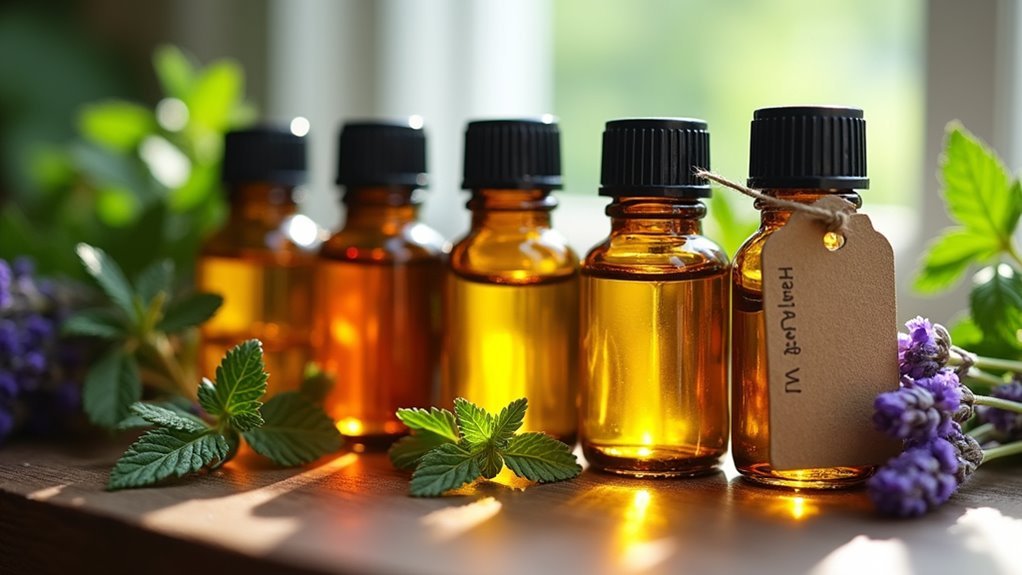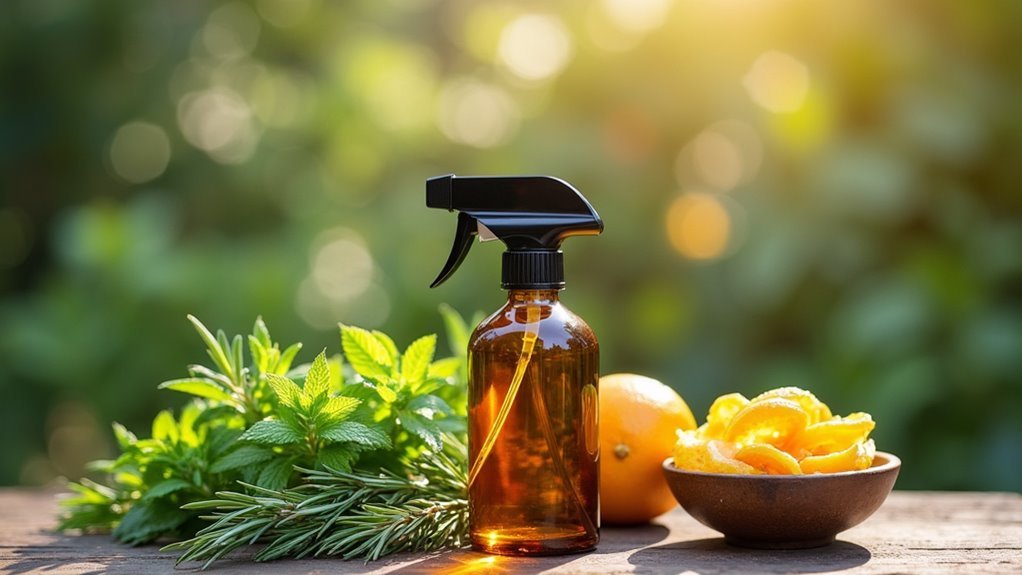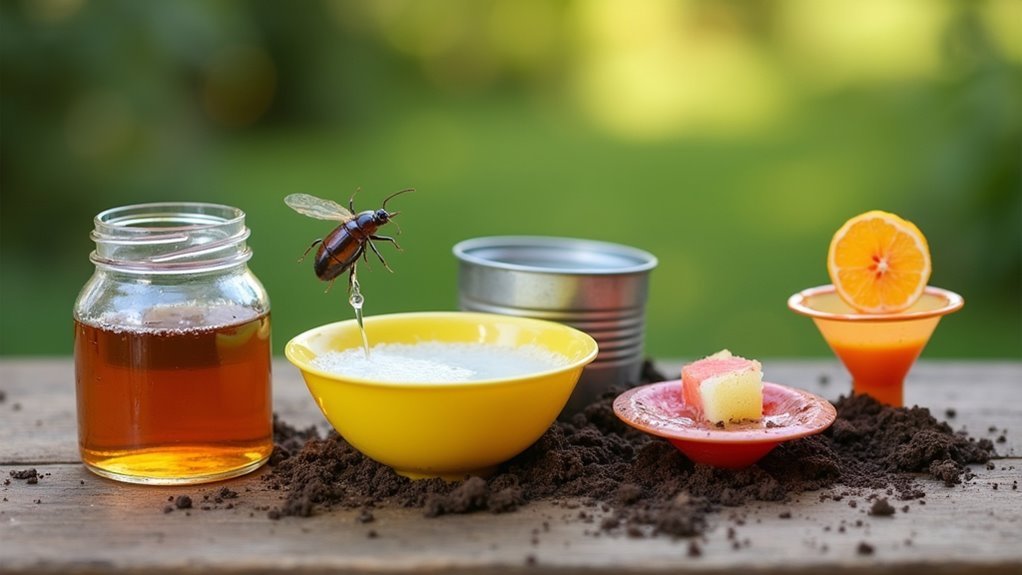You can create effective hornet repellents using simple household ingredients that match commercial pesticide performance. Mix 10 drops of peppermint oil with 1 cup of water for a powerful spray, or combine equal parts white vinegar and water to disrupt their navigation. Dish soap mixed with water provides immediate knockdown effects, while citrus peels scattered around entry points offer natural deterrence. These proven methods will help you discover extensive strategies for hornet-free outdoor spaces.
Essential Oil Spray Mixtures for Hornet Control

When hornets threaten your outdoor space, essential oils sprays offer a natural and effective solution that disrupts their navigation systems without harsh chemicals.
You can create powerful homemade deterrent mixtures using peppermint oil, clove, and geranium blended with water and dish soap. This natural insect repellent works by overwhelming hornets’ scent receptors, making your property less attractive for wasp nests.
Mix 10 drops of peppermint oil with one cup of water for a simple spray mixture that’ll repel wasps effectively. Citrus-based essential oils like lemon balm and lemongrass also create excellent alternatives.
Studies confirm these blends block hornet attraction, making them viable for pest control. You’ll need regular reapplication since effectiveness diminishes after rain or heavy dew.
Homemade Hornet Traps Using Household Items
If you’re dealing with persistent hornet problems, building effective traps from common household items offers an affordable solution that captures these aggressive insects before they establish colonies near your home. These homemade wasp traps use simple materials you already have.
Create a plastic bottle trap by cutting off the top third and inverting it into the bottom section. Fill with sugar water or sweet soda as bait to attract wasps effectively. Alternatively, use a jar filled with beer, sugar, and water, covering it with punctured plastic wrap.
| Trap Component | Household Item | Purpose |
|---|---|---|
| Container | Plastic bottle/jar | Houses the trap mechanism |
| Attractant | Sugar water/beer mix | Lures hornets inside |
| Entry method | Inverted top/punctured wrap | Allows entry, prevents escape |
Place traps 10-20 feet from gathering areas and refresh bait weekly. Multiple traps increase effectiveness before nest removal becomes necessary.
Peppermint Oil Solutions That Repel Hornets

While hornets rely heavily on their sense of smell for navigation and communication, peppermint oil’s potent aroma effectively disrupts these abilities and drives them away from treated areas.
This natural deterrent serves as an excellent non-toxic repellent that’s safe for your family and pets.
To repel hornets effectively with peppermint oil, follow these steps:
- Mix 10 drops of peppermint oil with 1 cup of water in a spray bottle
- Spray the solution around areas where hornets commonly gather
- Soak cotton pads in peppermint oil and place them strategically around outdoor spaces
- Maintain regular application every few days or after rainfall for ideal results
This homemade solution creates an invisible barrier that hornets won’t cross, protecting your outdoor spaces naturally.
Citrus-Based Natural Hornet Deterrents
Since hornets possess an acute sensitivity to strong scents, citrus-based deterrents offer another powerful natural solution for protecting your outdoor spaces.
You’ll find that citrus scents effectively disrupt hornet navigation while masking human odors that typically attract these pests.
Create a simple DIY spray by mixing equal parts water and lemon juice, then apply it around problem areas. The strong citrus aroma makes repelling hornets surprisingly straightforward.
Strong citrus scents naturally disrupt hornet navigation patterns, making lemon juice spray an effective and eco-friendly deterrent solution.
You can also scatter fresh citrus peels near entry points or outdoor dining areas for added protection.
For enhanced effectiveness, dilute citrus essential oils like lemon or orange in water for a potent spray solution.
These natural deterrents require regular reapplication, especially after rainfall, to maintain their repellent properties throughout hornet season.
Soap and Water Spray for Immediate Results

You’ll find that soap and water spray offers one of the fastest-acting solutions for hornet control, requiring just 2 tablespoons of dish soap mixed with 2 cups of water.
The mixture works by breaking down the hornet’s exoskeleton, suffocating them on contact for immediate results.
For maximum effectiveness, you’ll want to apply this homemade spray during early morning or dusk when hornets are less active and more vulnerable.
Quick Mixing Instructions
When hornets threaten your outdoor space, you can quickly create an effective deterrent using just two common household items. This natural soap spray works similarly on wasps and provides immediate results without harsh chemicals.
Follow these quick mixing instructions:
- Measure ingredients – Add 2 tablespoons of dish soap to 2 cups of water in a spray bottle.
- Mix thoroughly – Shake vigorously until soap dissolves completely into the water.
- Test spray nozzle – Confirm proper mist coverage before approaching any nest.
- Add essential oil – Include 10 drops of peppermint oil to help repel future hornets.
Apply this mixture during evening hours when hornets are less active. The soap coats their exoskeleton, causing rapid immobilization upon contact while creating a natural barrier around treated areas.
Best Application Times
Timing your soap spray application correctly makes the difference between success and frustration when dealing with hornets.
You’ll achieve best results by targeting early morning or dusk when wasps are less active and gathered in their nest. Apply the soap and water solution directly onto the nest during nighttime hours for maximum penetration, as hornets won’t aggressively defend their territory.
You’ll need frequent reapplication if hornets remain active after initial treatment, particularly during spring through fall peak seasons.
Don’t forget reapplication after rain or heavy dew washes away your soap solution’s effectiveness.
During nighttime applications, you can safely approach closer to the nest, ensuring your soap mixture reaches deep into hornet colonies for complete elimination.
Strategic Plant Choices That Keep Hornets Away
You can create a natural barrier against hornets by selecting specific plants that release scents these insects find repulsive.
The key lies in choosing the right varieties and positioning them strategically around your property’s entry points and outdoor living areas.
Proper placement and basic care will guarantee these plants remain effective deterrents while enhancing your garden’s beauty and functionality.
Natural Repellent Plants
Since hornets rely heavily on their sense of smell to navigate and locate food sources, strategically planting certain herbs and aromatic plants around your property creates a natural deterrent system that’s both effective and environmentally friendly.
These natural wasp repellents offer dual benefits – they’ll protect your outdoor spaces while enhancing your garden’s beauty and functionality:
- Spearmint and peppermint – Plant these around entry points; their strong scent effectively deters hornets while adding fragrance to your landscape.
- Lemongrass – Easy to grow in containers, this citronella-rich plant repels stinging insects and provides culinary benefits.
- Thyme – Low-maintenance herb that attracts beneficial bees while repelling hornets, creating balanced garden ecology.
- Basil, rosemary, and eucalyptus – These aromatic plants contain natural oils that create protective barriers against hornets while expanding your cooking options.
Placement and Care
The effectiveness of hornet-repelling plants depends heavily on where you place them and how well you maintain their growth. When planting spearmint, eucalyptus, and other deterrent herbs, position them strategically around entry points like doors, windows, and outdoor dining spaces where hornets typically gather.
These plants should be strategically positioned to create natural barriers while maximizing their coverage.
Grow spearmint in containers to prevent invasive spreading while maintaining its repelling power. Regularly trimming your plants guarantees they produce strong fragrances that effectively repel hornets.
Healthy, vigorous growth emits more potent scents than neglected plants.
Focus on outdoor areas where you spend the most time, such as patios and garden seating zones. Proper spacing allows each plant to thrive while creating overlapping scent zones for maximum protection.
Vinegar-Based Repellent Formulas
Vinegar serves as one of nature’s most accessible hornet deterrents, disrupting these aggressive insects’ navigation systems with its pungent aroma.
Vinegar’s strong scent naturally confuses hornets’ ability to navigate, making it an effective and accessible natural repellent for homeowners.
This non-toxic, eco-friendly repellent offers a safe alternative to chemical pesticides around children and pets.
Create effective vinegar-based solutions using these formulas:
- Basic Repellent: Mix equal parts white vinegar and water in a spray bottle for standard deterrent application.
- Lethal Mix: Combine vinegar with dish soap in a 1:3 ratio (one part vinegar to three parts water) to kill hornets on contact through suffocation.
- Application Areas: Spray around patios, gardens, and potential nesting sites for maximum protection.
- Maintenance Schedule: Reapply after rain or heavy dew since moisture dilutes the solution’s effectiveness.
These formulas provide reliable hornet control without environmental harm.
Fake Nest Decoys to Deter Territory Invasion
When hornets scout for nesting locations, they’ll naturally avoid areas where other colonies have already established territory. This behavior makes fake wasp nest decoys an effective deterrent strategy. Since hornets are territorial insects, they’ll typically steer clear of spaces that already appear occupied.
You can purchase or create decoy nests using paper bags or plastic materials. Position them in visible locations under eaves, porches, or trees where hornets would naturally scout. The key is making them look authentic enough to signal territory effectively.
| Strategy | Effectiveness |
|---|---|
| Single decoy | Moderate |
| Multiple decoy nests | High |
| Visible placement | Essential |
| Regular maintenance | Critical |
Install several decoys throughout your property for maximum impact in preventing hornet invasions. Remember to monitor and maintain their appearance regularly, as weathered decoys lose their territorial signaling power.
Garlic and Cayenne Pepper Natural Barriers
Natural kitchen ingredients offer powerful alternatives to chemical repellents, with garlic and cayenne pepper leading the way as effective hornet deterrents.
These non-toxic solutions create reliable barriers around your property while keeping your family and pets safe.
Creating Your Natural Repellent System:
- Garlic deployment – Crush fresh cloves and place them strategically near nests or high-traffic hornet areas.
- Homemade cayenne spray – Mix 1 teaspoon cayenne pepper with 1 cup water for an effective barrier spray.
- Strategic application – Target entry points, garden perimeters, and outdoor dining areas.
- Maintenance schedule – Reapply after rain or heavy dew to maintain potency.
Both ingredients work because their strong scents and spicy properties naturally repel hornets without harmful chemicals, making them ideal for sustainable pest control.
Frequently Asked Questions
How Do You Make Homemade Hornet Deterrent?
You’ll mix equal parts water and white vinegar in a spray bottle. You can also combine dish soap with water or add essential oils like peppermint for effective deterrent solutions.
What Smell Do Hornets Hate?
Hornets hate strong scents like peppermint, clove, and eucalyptus essential oils. You’ll also find they’re repelled by citrus peels, vinegar’s pungent odor, garlic, and herbs like basil and thyme in your garden.
What Is the Best Thing to Keep Hornets Away?
You’ll get best results combining multiple methods: spray peppermint essential oil solutions around your property, plant spearmint and thyme, hang fake nests, keep areas clean, and set sugar-water traps strategically.
How Does Dawn Dish Soap Kill Wasps?
Dawn dish soap kills wasps by breaking down their exoskeleton and clogging their breathing pores. You’re fundamentally suffocating them while the soap’s surfactant properties penetrate their body, causing rapid immobilization and death.
In Summary
You’ve got plenty of natural options to keep hornets away from your property. Try combining multiple methods for better results – use essential oil sprays around entry points, set up homemade traps in problem areas, and plant deterrent herbs near outdoor spaces. Remember to reapply liquid solutions regularly, especially after rain. With consistent application of these homemade repellents, you’ll create an effective barrier that keeps hornets from bothering your family.





Leave a Reply